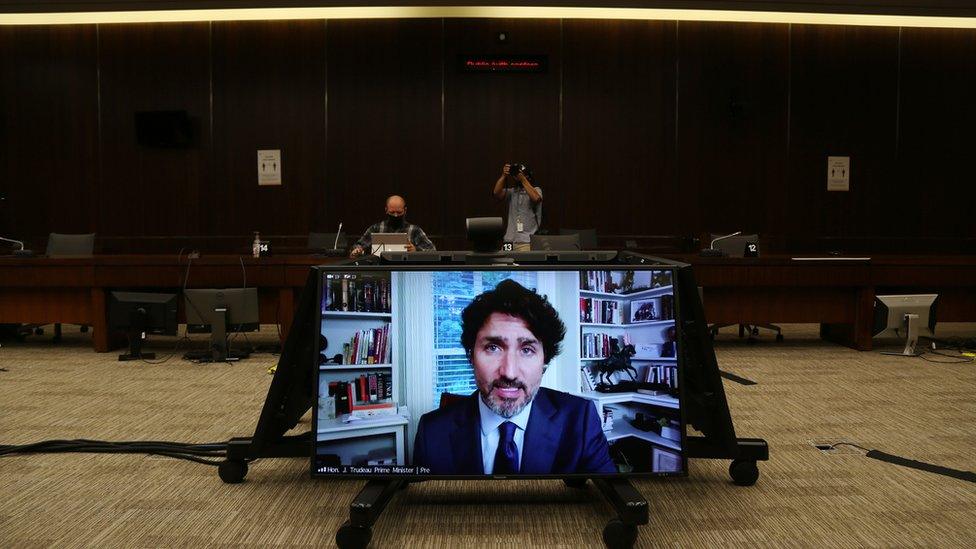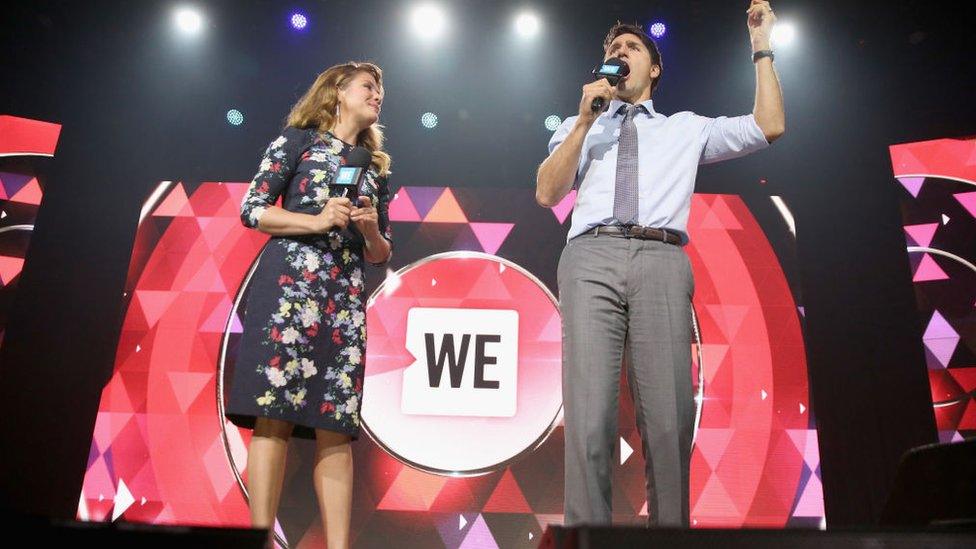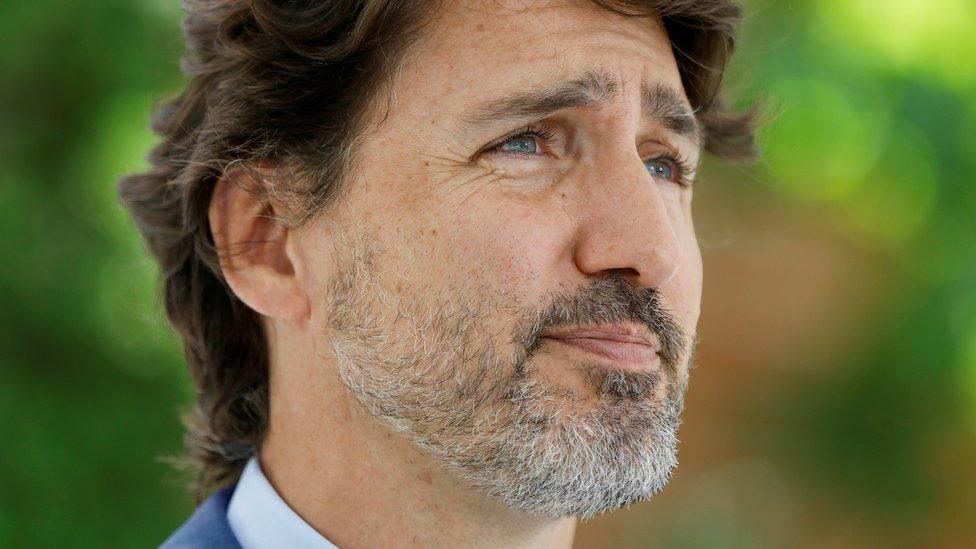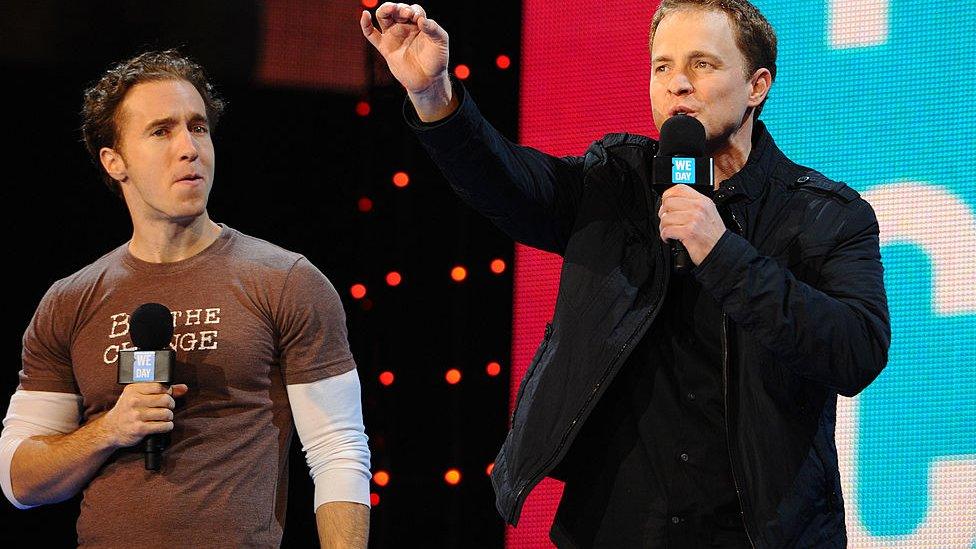Trudeau denies 'preferential treatment' in ethics scandal
- Published
Canadian PM Justin Trudeau claims "no preferential treatment" was given to WE Charity
Canadian Prime Minister Justin Trudeau has denied playing any role in picking a charity with ties to his family to manage a major government programme.
Testifying to the House of Commons, he rejected any involvement by him or his staff in the programme that has caused a huge political controversy in Canada.
Mr Trudeau is under scrutiny for failing to recuse himself from decisions around the programme.
He is being investigated by a federal ethics watchdog for failing to do so.
On Thursday, Mr Trudeau told the finance committee in Ottawa that the decision to tap WE Charity for the student volunteerism programme was made independently by the federal public service.
He says he only learned that the charity had been recommended by the public service for the programme in early May.
WE Charity had previously paid the prime minister's mother and brother to speak at events and Mr Trudeau and his wife were involved with the organisation.
The prime minister says he knew that there would be scrutiny over the agreement because of those ties, so he asked bureaucrats to "do their due diligence" when he first learned of the plan to have them manage the programme.
He said they came back two weeks later and told him that WE Charity was the only organisation that could administer the programme.
"WE Charity received no preferential treatment not from me, not from anyone else," he told parliamentarians.
Opposition MPs on Thursday accused Mr Trudeau of throwing the public service "under the bus".
What's the background?
The case centres around the decision to have WE Charity administer Canada's new Student Service Grant Programme.
The programme, which had an initial budget of C$912m ($680m, £534m), was meant to give students grants for volunteer roles to help make up for the lack of summer jobs due to the pandemic.

The prime minister testified via videoconference
Margaret Trudeau was paid C$250,000 for speaking at 28 WE events over four years, and brother Alexandre was paid C$32,000 for speaking at eight between 2017-2018.
Mr Trudeau and his wife Sophie Gregoire Trudeau have both regularly appeared in the charity's events.
Trudeau family members were also reimbursed for some expenses related to these events.
We Charity withdrew from the contract over the controversy on 2 July. Mr Trudeau has apologised for not recusing himself from related discussions.
Federal finance minister Bill Morneau's family also has ties to WE Charity.
What is WE Charity?
WE Charity was founded 25 years ago by brothers Craig and Marc Kielburger in their parents' home in Thornhill, Ontario, when Craig was just 12 years old.
Formerly known as Free the Children, the charity focused on ending child exploitation and quickly drew international recognition.
The charity's WE Day motivational speaking conferences have become rites of passage for many young Canadians, who are drawn to its message that they can change the world. The roster of celebrity speakers and performers has also appealed to many participants.
It is now a wide-ranging organisation with operations in the UK, Canada and the US.
Its founders told parliamentarians on 28 July they did not receive the contribution agreement due to any political connections and did not gain financially.
How will this affect Trudeau?
This is the third ethics investigation in Mr Trudeau's five years in office.
In 2017, a government ethics watchdog ruled that the prime minister violated conflict of interest rules when he and his family vacationed with billionaire spiritual leader Aga Khan.
The billionaire's foundation is a registered lobbyist and has received hundreds of millions from the federal government over the past several decades, from both the Liberal and Conservative parties.
Last August, the federal ethics tsar found that Mr Trudeau broke federal conflict of interest rules by trying to influence a former minister in the SNC-Lavalin corruption inquiry.
In the wake of this latest controversy, Mr Trudeau's Liberal Party has taken a hit in the polls, though his government had been doing well over its pandemic response before.
An Abacus Data poll on Thursday showed Liberals dropping to a four-point lead over Conservatives.
A poll by Nanos Research, external found Mr Trudeau was the preferred prime minister for 34% of Canadians, down from 40% last month. The Angus Reid Institute, external found his approval ratings had fallen 11 points since May - and that the losses came primarily from Liberal voters.
- Published20 August 2020

- Published13 July 2020

- Published3 July 2020
